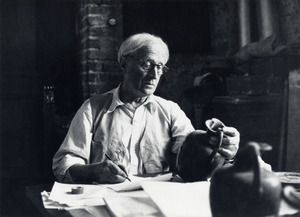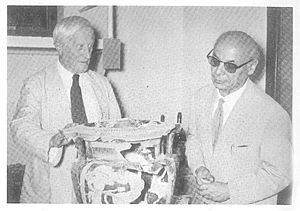John Beazley facts for kids
Quick facts for kids
John Beazley
|
|
|---|---|

Beazley cataloguing an unidentified vase in 1956
|
|
| Born |
John Davidson Beazley
13 September 1885 |
| Died | 6 May 1970 (aged 84) |
| Alma mater | Balliol College, Oxford (BA) |
|
Notable work
|
|
| Title | Lincoln Professor of Classical Archaeology and Art |
| Board member of | British Academy |
| Spouse(s) |
Marie Ezra
(m. 1919; died 1967) |
| Awards | Order of the Companions of Honour |
| Scientific career | |
| Institutions |
|
Sir John Davidson Beazley (born September 13, 1885 – died May 6, 1970) was a British expert in ancient art and history. He was famous for figuring out who made many ancient Greek pots, especially those from a place called Attica. He did this by studying their unique artistic styles.
Sir John was a professor at the University of Oxford from 1925 to 1956. He taught about classical archaeology and art.
Contents
Early Life and Education
John Beazley was born in Glasgow, Scotland, on September 13, 1885. His parents were Mark John Murray Beazley and Mary Catherine Beazley.
He went to school at King Edward VI School, Southampton and Christ's Hospital in Sussex. Later, he studied at Balliol College, Oxford. He focused on subjects like ancient history, philosophy, and literature. He did very well in his studies and earned his Bachelor of Arts (BA) degree in 1907. While at Oxford, he became good friends with the poet James Elroy Flecker.
His Career in Academia
After finishing college, Beazley spent some time at the British School at Athens. This is a place where people study ancient Greece.
He then returned to the University of Oxford. He became a tutor and a fellow at Christ Church, teaching Classics.
World War I Service
During World War I, John Beazley worked in military intelligence. This means he helped gather important information for the military. He worked in a special part of the Navy called Room 40. Here, he helped to decode secret messages. His colleagues included another archaeologist, Winifred Lamb.
Becoming a Professor
In 1925, Beazley became the Lincoln Professor of Classical Archaeology and Art at the University of Oxford. He held this important job until 1956.
He became a world expert on ancient Greek decorated pottery. He especially studied black-figure and red-figure vases. These are types of pottery with distinct painting styles.
He used a special method to figure out which artist or workshop made a particular pot. Even if a pot wasn't signed, he could identify the "hand" (style) of the artist. For example, he was the first to identify the work of an artist he named the Berlin Painter. He looked at many different pots, big and small, to create a history of artists and workshops in ancient Athens.
His most famous book, Attic Red-figure Vase-painters, was published in English in 1942.
Later Years and Legacy
Sir John Beazley retired in 1956. However, he continued to work on his research until he passed away in Oxford on May 6, 1970.
His personal collection of notes and research was bought by the University of Oxford in 1964. It is now part of the Classical Art Research Centre.
Awards and Recognition
Sir John Beazley received many honors for his important work.
- In 1927, he was chosen as a Fellow of the British Academy (FBA).
- In 1949, he was made a Knight Bachelor, which gave him the title sir.
- In 1954, he became an honorary member of the American Academy of Arts and Sciences.
- In 1959, he was given the Order of the Companions of Honour for his great contributions to scholarship.
Family Life
In 1919, John Beazley married Marie Ezra, who was a widow. Her first husband had died in World War I. Marie passed away in 1967.
Marie's daughter from her first marriage, Mary Ezra, later married the Irish poet Louis MacNeice.
Sir John Beazley's notes and drawings are kept in the Bodleian Library at Oxford. They include his thoughts on Greek literature and art, as well as some fun drawings of people he knew.
See also
In Spanish: John Beazley para niños
 | Lonnie Johnson |
 | Granville Woods |
 | Lewis Howard Latimer |
 | James West |


